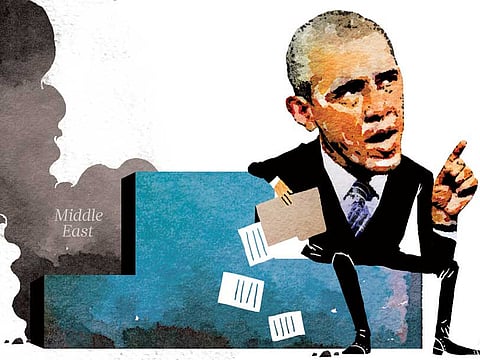Obama will be remembered for his failures
What angers Arabs most is the US president’s total indifference towards Iran’s dangerous meddling in the region

While the United States has resigned from its role as the leading world champion, it shouldn’t be surprising to see how this action has created an unprecedented vacuum, with dangerous and even evil powers queuing up to fill that void. This sadly has been the case in the Middle East and Europe and even in some parts of Africa over the last few years. Having reached the dying days of his second and final term, US President Barack Obama’s administration is clearly going down the route, in the eyes of so many the world over, of a declining power.
It was clear from the early days of his first term that the American president wanted to opt out of the world’s crises — whether in Afghanistan, Iraq and even Europe. Of course, as chief-of-staff of the only super power, it is his responsibility to decide on the best course of action to serve his country’ interests first. His intention was made clear that he wanted to pull his country out from the quagmires of the war zones in Afghanistan and Iraq that cost US tax payers more than $3 trillion (Dh11 trillion) causing the largest deficit ever seen in America’s history since the great depression of 1930s. Some 15 million Americans were unemployed and nearly half of the country’s banks collapsed and the economy did not fully turn around until 1939, when the Second World War infused life back into America’s industries.
Contrary to his predecessors, Obama’s policy of constraints defined his administration almost right from the beginning. For many, particularly Arabs, the American president brought hope and vision to help steer the region away from the misery of wars to the road to peace, stability and prosperity. There are many reasons for that:
First, in one of the major initiatives that the Obama administration took, just days after Obama moved into the White House on January 29, 2009, Hisham Melhem — the Washington D.C.-based chief-of-bureau of Saudi-owned pan-Arab satellite news channel Al Arabiya — was invited to interview the newly-elected president. He was intentionally picked from among hundreds of White House correspondents to convey the president’s message to the Arab and Muslim worlds. Al Arabia was seen then as a prominent voice of moderation in the Middle East, presenting calmer analysis than what many considered its rival and more sensational Al Jazeera was doing. Significantly, Obama said in his interview: “My job is to communicate the fact that the United States has a stake in the well-being of the Muslim world, that the language we use has to be a language of respect. My job to the Muslim world is to communicate that the Americans are not your enemy.”
Second, on the back of this remarkable interview, Obama held important head-to-head meetings in the White House with King Abdullah of Jordan, Israeli Prime Minister Benjamin Netanyahu and Palestinian President Mahmoud Abbas. But his most significant move came on June 4, 2009, when he delivered a wide-ranging speech, titled ‘A new beginning’, from the Major Reception Hall at Cairo University. Al Azhar University co-hosted the event. Obama reached out to the Muslim world and said he was seeking “a new way forward, based on mutual respect and mutual interest”. He also said he was willing to “extend a hand” to those “who clinch power through corruption and deceit, if they are willing to unclench their fists”. On March 19, 2009, Obama continued his outreach even to Iran, whose leadership rebuffed him promptly.
The Cairo speech came about in response to a promise that Obama had made during his presidential campaign, to deliver a major address to Muslims from a Muslim capital during his first few months as president. He spoke in his speech about putting an end to his country’s wars in the region and beyond, achieving Arab-Israeli peace in his first term based on the Saudi peace initiative of 2002, engaging Syria and Iran and helping Arabs who rebelled against despots.
Third, the American president has certainly earned wide-ranging international respect as a result of his statements and diplomatic moves before the first year of his presidency even ended. In fact, the 2009 Nobel Peace Prize was awarded on October 9 to Obama for “extraordinary efforts to strengthen international diplomacy and cooperation between people”, the Norwegian Nobel Prize Committee declared. The committee cited Obama’s promotion of nuclear non-proliferation, but more importantly, the committee highlighted the “new climate in international relations” fostered by Obama, particularly in “reaching out to the Muslim World”.
Obama accepted the prize in Oslo on December 10, 2009, and in a 36-minute speech, he concentrated on the overwhelming tension threatening world peace and discussed the idea of a “just war”. He said: “Perhaps the most profound issue surrounding my receipt of this prize is the fact that I am the commander-in-chief of the military of a nation in the midst of two wars.” However, the Nobel Committee’s decision rightly drew mixed reaction from US commentators and editorial writers across the political spectrum the world over. The general feeling was that the prize had been awarded on the basis of intention rather than deeds.
Now, Obama is expected to pursue pretty much the same policy of refraining from confrontation when it is urgently needed, as he is approaching his final days in the White House. What angers Arabs most is Obama’s total indifference to Iran’s dangerous meddling in the backyard of Saudi Arabia and other Arab Gulf countries, as well as his total indecisiveness on standing up against Syrian President Bashar Al Assad and Hezbollah’s murderous role in the worst human tragedy this century.
Mustapha Karkouti is a former president of the Foreign Press Association, London. You can follow him on Twitter at www.twitter.com/@mustaphatache
Sign up for the Daily Briefing
Get the latest news and updates straight to your inbox



